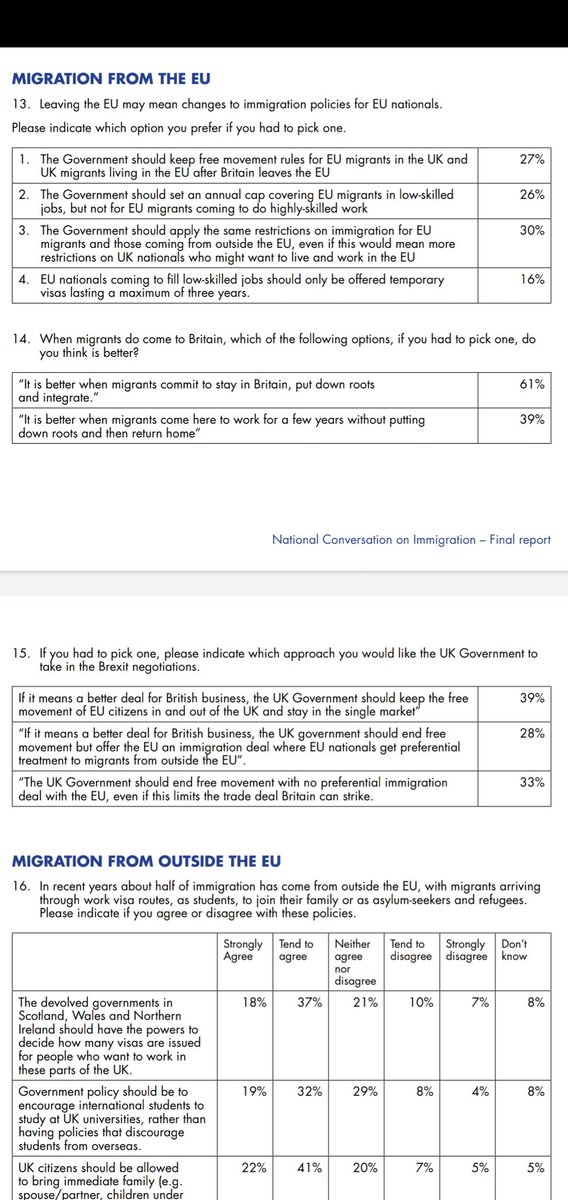There could be several different explanations of this type of poll result. I don& #39;t know which of them best explain it, but will suggest some hypotheses. (This is an eye-catching example of a long-standing feature of how different frames get different responses) https://twitter.com/jdportes/status/1194336599842144256">https://twitter.com/jdportes/...
Firstly, captures how many people are cross-pressured on migration. Only 15-20% consistently give "open" or "closed" answers.
Majorities are "balancers" who can often endorse an overlapping range of control/manage (& reduce) & welcome contributions/gains (& maintain)
Majorities are "balancers" who can often endorse an overlapping range of control/manage (& reduce) & welcome contributions/gains (& maintain)
Secondly, it captures how what is missing here (the term "free movement") is not a good brand with that balancer middle ground
People moving to live and work and study in UK/EU appears to do much better than "freedom of movement". Eurobarometer consistently gets that finding.
People moving to live and work and study in UK/EU appears to do much better than "freedom of movement". Eurobarometer consistently gets that finding.
Why? "Free movement" wants to be about freedom, opportunity and openness. But it is also being received as free = uncontrolled. (It& #39;s advocates then argue that is a myth; that FoM is controlled, regulated and rules-based, but this is somewhat running against the "free" brand).
Does this finding show that, if people were reminded about reciprocity, then "we can go there too" would trump people being able to come here? Maybe - that is a natural intuition to seeing this result. But maybe not too - because it seems v. difficult to equalise the salience
The reciprocity = fairness framing is strong here.
It might be that some respondents are thinking about principle if maintaining the rights of those who have already moved (which is very very broadly popular) and others may see this as primarily about future movement.
It might be that some respondents are thinking about principle if maintaining the rights of those who have already moved (which is very very broadly popular) and others may see this as primarily about future movement.
So "retain the right" may be ambiguous
- for the future, some people may be thinking *maintain existing FoM rights* but others might say yes to something softer, living abroad is still something that should be able to happen (even if there are some new rules)
- for the future, some people may be thinking *maintain existing FoM rights* but others might say yes to something softer, living abroad is still something that should be able to happen (even if there are some new rules)
The political weakness of reciprocity as a public argument is that those keenest to avail themselves of that right/opportunity were mostly not the people sceptical of the value of other people coming here to exercise it too. (By age and by education).
Could try to bridge that eg, & #39;lets agree we should work harder at managing the impacts fairly for everyone here (eg invest in local services to keep up with pop change, promote contact).If we do that here, you may not want to curtail opportunity for your children/grandchildren
https://twitter.com/sundersays/status/1194384268744699908?s=19">https://twitter.com/sundersay...
UK attitudes did soften & warm towards free movement after June 2016 (see Eurobarometer shift in this Jan 2017 blog) related to a general lowering of salience & gradual shift to more positive attitudes. http://lartsocial.org/fog-channel-what-do-eu-27-nations-think-about-freedom-movement">https://lartsocial.org/fog-chann...
Underexplored issue: deciding to seek a reciprocal deal (whether with EU27, Australia or India) is one way to exercise your control, choice and sovereignty.
That is why two-thirds for "we want control" and two-thirds for "seek that deal" maybe compatible https://twitter.com/sundersays/status/822148798629691393?s=19">https://twitter.com/sundersay...
That is why two-thirds for "we want control" and two-thirds for "seek that deal" maybe compatible https://twitter.com/sundersays/status/822148798629691393?s=19">https://twitter.com/sundersay...
Broader trends on economic and cultural impact of migration over time show softening and warming of attitudes, either despite 2016 referendum, or partly because of it https://twitter.com/peter_starkings/status/1016626338353111044?s=19">https://twitter.com/peter_sta...
I think it would be a mistake to see the finding as a slam-dunk (what was everyone thinking, FoM was really popular all along) but more sensible to see it as demonstrating that most people can be engaged in arguments about the contribution of migration & the range of poss choices
The National Conversation found that free movement/single market was the one migration issue that did split people by referendum and party tribes. It is a broader disagreement about Brexit as much as about immigration itself
A Brexit/migration polarisation paradox? https://twitter.com/sundersays/status/1090229465463091200?s=19">https://twitter.com/sundersay...
Source for this poll. Via @willbott4 & @jdportes https://twitter.com/willbott4/status/1194334040062431232?s=19">https://twitter.com/willbott4...

 Read on Twitter
Read on Twitter


